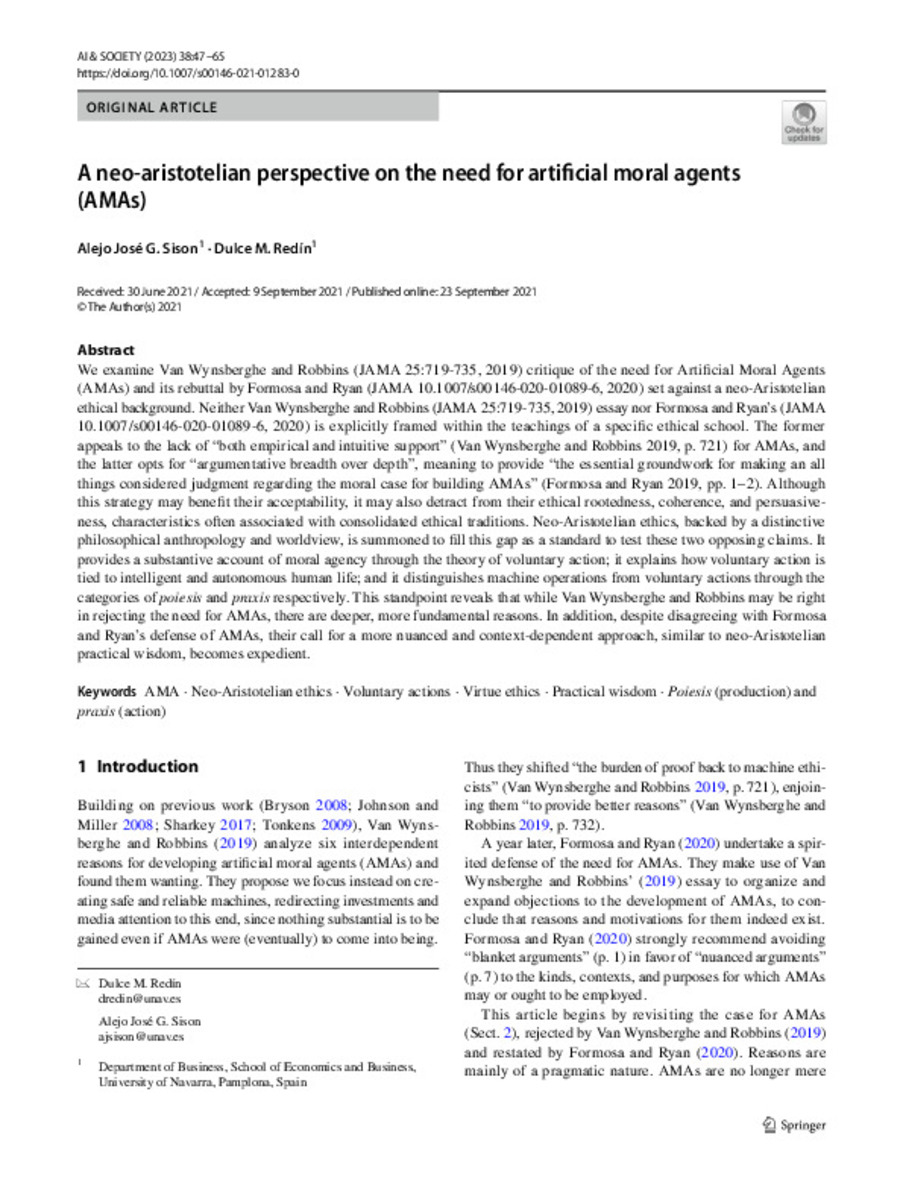Full metadata record
| DC Field | Value | Language |
|---|---|---|
| dc.creator | Sison, A.J. (Alejo José) | - |
| dc.creator | Redin-Goñi, D. (Dulce) | - |
| dc.date.accessioned | 2023-04-25T09:45:41Z | - |
| dc.date.available | 2023-04-25T09:45:41Z | - |
| dc.date.issued | 2021 | - |
| dc.identifier.citation | Sison, A.J. (Alejo José); Redin, D. (Dulce). "A neo-aristotelian perspective on the need for artificial moral agents (AMAs)". AI & Society. (38), 2021, 47 - 65 | es_ES |
| dc.identifier.issn | 1435-5655 | - |
| dc.identifier.uri | https://hdl.handle.net/10171/66106 | - |
| dc.description.abstract | We examine Van Wynsberghe and Robbins (JAMA 25:719-735, 2019) critique of the need for Artifcial Moral Agents (AMAs) and its rebuttal by Formosa and Ryan (JAMA 10.1007/s00146-020-01089-6, 2020) set against a neo-Aristotelian ethical background. Neither Van Wynsberghe and Robbins (JAMA 25:719-735, 2019) essay nor Formosa and Ryan’s (JAMA 10.1007/s00146-020-01089-6, 2020) is explicitly framed within the teachings of a specifc ethical school. The former appeals to the lack of “both empirical and intuitive support” (Van Wynsberghe and Robbins 2019, p. 721) for AMAs, and the latter opts for “argumentative breadth over depth”, meaning to provide “the essential groundwork for making an all things considered judgment regarding the moral case for building AMAs” (Formosa and Ryan 2019, pp. 1–2). Although this strategy may beneft their acceptability, it may also detract from their ethical rootedness, coherence, and persuasiveness, characteristics often associated with consolidated ethical traditions. Neo-Aristotelian ethics, backed by a distinctive philosophical anthropology and worldview, is summoned to fll this gap as a standard to test these two opposing claims. It provides a substantive account of moral agency through the theory of voluntary action; it explains how voluntary action is tied to intelligent and autonomous human life; and it distinguishes machine operations from voluntary actions through the categories of poiesis and praxis respectively. This standpoint reveals that while Van Wynsberghe and Robbins may be right in rejecting the need for AMAs, there are deeper, more fundamental reasons. In addition, despite disagreeing with Formosa and Ryan’s defense of AMAs, their call for a more nuanced and context-dependent approach, similar to neo-Aristotelian practical wisdom, becomes expedient. | es_ES |
| dc.description.sponsorship | Research for this paper was supported by the University of Navarra, under the “How Virtue Ethics can Engage with AI in Business” research project and by the Ministry of Science and Innovation of the Government of Spain grant RTI2018-100946-B-100. | es_ES |
| dc.language.iso | eng | es_ES |
| dc.publisher | Springer | es_ES |
| dc.rights | info:eu-repo/semantics/openAccess | es_ES |
| dc.subject | AMA | es_ES |
| dc.subject | Neo-Aristotelian ethics | es_ES |
| dc.subject | Voluntary actions | es_ES |
| dc.subject | Virtue ethics | es_ES |
| dc.subject | Practical wisdom | es_ES |
| dc.subject | Poiesis (production) and praxis (action) | es_ES |
| dc.title | A neo-aristotelian perspective on the need for artificial moral agents (AMAs) | es_ES |
| dc.type | info:eu-repo/semantics/article | es_ES |
| dc.description.note | This article is licensed under a Creative Commons Attribution 4.0 International License | es_ES |
| dc.identifier.doi | 10.1007/s00146-021-01283-0 | - |
| dadun.citation.endingPage | 65 | es_ES |
| dadun.citation.number | 38 | es_ES |
| dadun.citation.publicationName | AI & Society | es_ES |
| dadun.citation.startingPage | 47 | es_ES |
Files in This Item:
Statistics and impact
Items in Dadun are protected by copyright, with all rights reserved, unless otherwise indicated.






